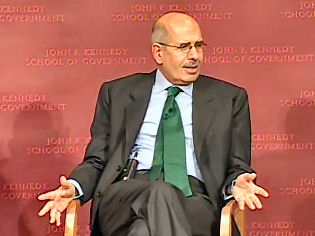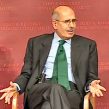
THE IRANIAN TEST FOR PUTIN’S NEW COURSE
Publication: Eurasia Daily Monitor Volume: 4 Issue: 39
By:

The report on Iran’s nuclear program that Mohamed ElBaradei, director general of the International Atomic Energy Agency (IAEA), presented to the UN Security Council on February 22 presents an inescapable challenge for Russia. The fact of Tehran’s non-compliance with Resolution 1737, adopted by the Security Council on December 23, 2006, is established beyond doubt, since Iran has refused to stop work on uranium enrichment. The five permanent members of the Security Council – China, France, Russia, the United Kingdom, and the United States – are scheduled to meet today, February 26, to decide the next course of action. Logically, the Council has to craft a new resolution with tougher sanctions and a new deadline, but Russia, which had made great diplomatic effort in order to water down the punitive measures in Resolution 1737, hardly shows any readiness to take this new step (Lenta.ru, February 23; Rossiiskaya gazeta, February 22).
What is peculiar about the choice that the Kremlin is contemplating these days is that in essence it is not at all about Iran. While there are quite a few good experts on Iran in Moscow, there is very little — if any — commentary on Iranian domestic affairs in the media. It is entirely possible that the erosion of public support for a charismatic president is a theme beyond the boundaries of Russian “political correctness,” but even the substance of bilateral relations between Russia and Iran attracts scant attention.
Typically, the Bushehr nuclear power plant is presented as Russia’s key interest. According to Yevgeny Adamov, former atomic energy minister, it should have been completed in 2003 at the latest, but new delays might break even the final deadline set for November this year (Ekho Moskvy, February 23). This controversial project, however, is far less important for Russia’s export of nuclear technology than the recent agreement on constructing four nuclear reactors in India or, for that matter, than the possible new deals for developing nuclear energy in the Middle East discussed during Putin’s visit to Saudi Arabia earlier this month (Vremya novostei, February 16). Much the same way, the surface-to-air Tor-M1 missiles delivered to Iran this winter constitute only a minor element in Russia’s expanding arms exports (Vedomosti, February 22).
The real center of gravity of the Iranian problem, as far as Moscow is concerned, is in Russian-U.S. relations, which have acquired a whole new edge after Russian President Vladimir Putin’s abrasive presentation in Munich earlier this month. Experts in Moscow keep discussing this “historic” speech, discovering new depths in the rather tortured argument and comparing it with Churchill’s Fulton speech or even with the U.S. Declaration of Independence (Rossiiskaya gazeta, February 22; Expert, February 19). The bitterness of Putin’s complaints was quite sincere and the urge to give a “proper answer” to U.S. Vice President Dick Cheney’s speech in Vilnius last May was unmistakable (Ezhednevny zhurnal, February 20; Grani.ru, February 13).
Putin was emboldened to disparage Washington by the perception that “Comrade Wolf” had walked into a deadly trap in Iraq, but it was not his intention at all to launch a new Cold War-type confrontation. As seen from Moscow, U.S.-China relations have evolved into a real economic symbiosis, but Russian-U.S. relations lack a firm basis and depend upon shifting political winds (New Times, February 19). Putin sought to re-invent strategic arms control as a new basis for stable relations, but his overtures have found little interest in Washington. Russian strategic forces are shrinking so fast due to the physical and moral obsolesce of key Soviet-era weapon systems and recurrent problems with testing new designs that it makes little sense for the U.S. to enter into serious negotiations and accept new binding limitations on its offensive and defensive capabilities. This lack of attention from the perceived key partner/adversary renders the Russian nuclear arsenal politically irrelevant – and that really upsets Putin. Hence the emotional objections against the planned deployment in Poland and the Czech Republic of U.S. missile-defense systems; hence also the signals about a possible unilateral withdrawal from the 1987 INF Treaty (see EDM, January 24, February 21).
Moscow has certainly registered that the U.S. reaction to its serial verbal barrage has been remarkably restrained and administration officials characterized its escapades as “disappointing” or, at worst, “extremely unfortunate.” There is hardly any doubt about the reasoning behind this tolerance – Washington needs Russia’s cooperation in dealing with the Iran problem. The Kremlin has not missed the signals about the possible lifting of the irritating Jackson-Vanik Amendment and from its side has signaled its readiness to postpone the delivery of nuclear fuel to Bushehr scheduled for March, much to Tehran’s chagrin (Newsru.com, Nezavisimaya gazeta, February 21). At the same time, Putin seeks to deflect criticism about supplying arms to a state that challenges the non-proliferation regime with rather far-fetched counter-accusations that “military technology and special equipment,” including spare parts for F-14 fighters, are supplied to Iran by the Pentagon. This diplomatic dance, however, has arrived to a line that Putin has been so far reluctant to cross.
The condemnations of the “unipolar” world often find sympathetic attention and the anti-U.S. tirades resonate not only in Venezuela but in Europe as well, but blocking a UN resolution aimed at dismantling the uranium enrichment program in Iran is a different matter. Such a step would leave Putin isolated in Europe and invite wrath from the United States; what is more, it would undermine the role of the UN, which Moscow seeks to uphold. Putin’s dream of shielding his kakistocracy (by which the Greeks meant the rule of the least qualified and most unprincipled citizens) by a “stone wall” of international law, as spelled in Munich, comes into conflict with the desire to play a greater international role. The safest option appears to be ElBaradei’s proposal for a “time out” and new negotiation, but Putin might take a gamble of provoking Washington into unilateral military action. If nothing else, it would drive up oil prices.




